Southwest Purdue Agricultural Program (SWPAP)
What We Do
The SWPAP team's major focus is vegetable production, specifically cantaloupe and watermelon. Combined, watermelons and cantaloupes are grown on nearly 10,000 acres in the state, with the majority of the acreage in southwest Indiana. Annually watermelon and cantaloupe are valued at nearly $50 million. The creation of the program continues to allow for research-based extension information to be developed and delivered to vegetable and agronomic crop farmers in this region with similar environmental conditions and soil types.
Contact Us
Dr. Dan Egel
Clinical Engagement Associate Professor
Botany & Plant Pathology
4369 N. Purdue Road
Vincennes, IN 47591
Phone: (812) 886-0198
Email: egel@purdue.edu
Dr. Wenjing Guan
Clinical Engagement Assistant Professor
Horticulture & Landscape Architecture
4369 N. Purdue Road
Vincennes, IN 47591
Phone: (812) 886-0198
Email: guan40@purdue.edu
Learn More...
Mission
The mission of the Southwest Purdue Agricultural Program is to maintain a safe, quality food supply and a healthy environment while supporting families and communities associated with the agricultural industry.
Southwest Purdue Agricultural Program
The Southwest Purdue Agricultural Program is based in Vincennes, IN at the Southwest Purdue Agricultural Center and was established in 1990 to provide extension support for growers in the southern region of the state. The team is comprised of three individuals: Dan Egel, vegetable pathologist, Wenjing Guan, vegetable specialist, and Charles Mansfield, agronomy specialist. Vegetable production, specifically cantaloupe, and watermelon, is the major focus of the SWPAP team. Combined, watermelons and cantaloupes are grown on nearly 10,000 acres in the state, with the majority of the acreage in southwest Indiana. Annually watermelon and cantaloupe are valued at nearly $50 million. The creation of the program continues to allow for research-based extension information to be developed and delivered to vegetable and agronomic crop farmers in this region with similar environmental conditions and soil types. A recent addition to the program is the high tunnel project focused on developing practical information for this type of production system which is rapidly expanding in the state and the U.S. as a whole. Some recent projects are vegetable variety evaluation, fungicide trials for cucurbit and solanaceous vegetables, rootstock evaluation for vegetable grafting, fertility management of vegetables, variety disease resistance evaluation, and canola trials.
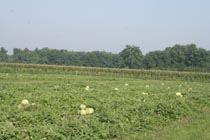
Annual seedless watermelon variety trial at the Southwest Purdue Agricultural Center
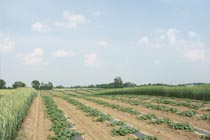
Commercial cantaloupe production in Southwest Indiana
Specialists
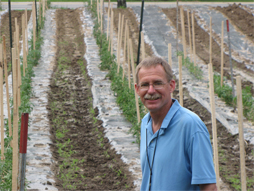
Extension
The goal of my extension program is the dissemination of up-to-date technical information via my own research, Purdue University campus-based work, or other established programs. Information exchange takes the form of in-season twilight meetings, winter technical meetings, field visits to commercial fields, grower office visits to SW Purdue Ag Center, phone calls, e-mails, and extension publications. In season I conduct diagnostic work in conjunction with the Plant Pest Diagnostic Laboratories in West Lafayette. As with all extension programs sponsored by Purdue University, the programs I am involved in emphasize Integrated Pest Management (IPM). An example of such a program is MELCAST, a weather-based disease-forecasting program (administered with Rick Latin) for the management of foliar diseases of muskmelon and watermelon
Research
The focus of my research involves the management of vegetable diseases important in Indiana. Fungicide trials on diseases such as gummy stem blight of watermelon, Alternaria leaf blight of muskmelon, downy mildew of pumpkin, and early blight of tomato aid in the management of these diseases. Other research concerns diseases that are not fully understood. An example would be the mature watermelon vine decline which has caused huge losses among Indiana growers. I have also conducted research that has elucidated the pathogen race situation of Fusarium wilt of watermelon in Indiana
Education
B.S., Botany, Miami University, Oxford, Ohio
M.S., Forestry, Purdue University, West Lafayette, IN
Ph.D., Plant Pathology, University of Florida, Gainesville, FL
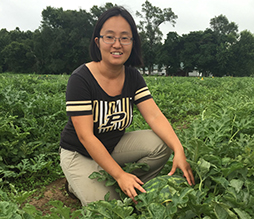
Dr. Wenjing Guan
Dr. Wenjing Guan's research and extension programs focus on developing and delivering sustainable vegetable and melon production practices that can increase the efficiency and profitability of specialty crop production in Indiana. Her research projects include:
- Watermelon and Cantaloupe variety evaluation
- Vegetable fertility management and fertilizer stimulant product evaluation
- Vegetable grafting
- Season extension with high tunnels
- HIGHTUNNEL PRODUCTION
- EXTENSION PUBLICATIONS
- NEWSLETTERS
- PURDUE VINCENNES CONNECTION
- RESOURCES
- PRESENTATIONS
Southwest Purdue Agricultural Program is located at:
4369 North Purdue Road, Vincennes, IN 47591
SWPAP may be contacted:
Via Phone at: 812-886-0198
Via Email at: Dr. Dan Egel
Via Email at: Dr. Wenjing Guan
Vegetable Crops Hotline
Vegetable Crops Hotline
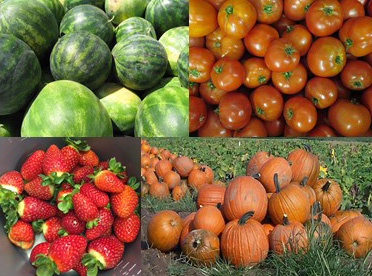
A newsletter for commercial vegetable growers prepared by the Purdue University Cooperative Extension Service
Current IssuePurdue Agricultural Centers
- DPAC - Davis-Purdue Agricultural Center
- FPAC - Feldun-Purdue Agricultural Center
- NEPAC - Northeast-Purdue Agricultural Center
- PPAC - Pinney-Purdue Agricultural Center
- SEPAC - Southeast-Purdue Agricultural Center
- SIPAC - Southern Indiana-Purdue Agricultural Center
- SWPAC - Southwest-Purdue Agricultural Center
- TPAC - Throckmorton-Purdue Agricultural Center
